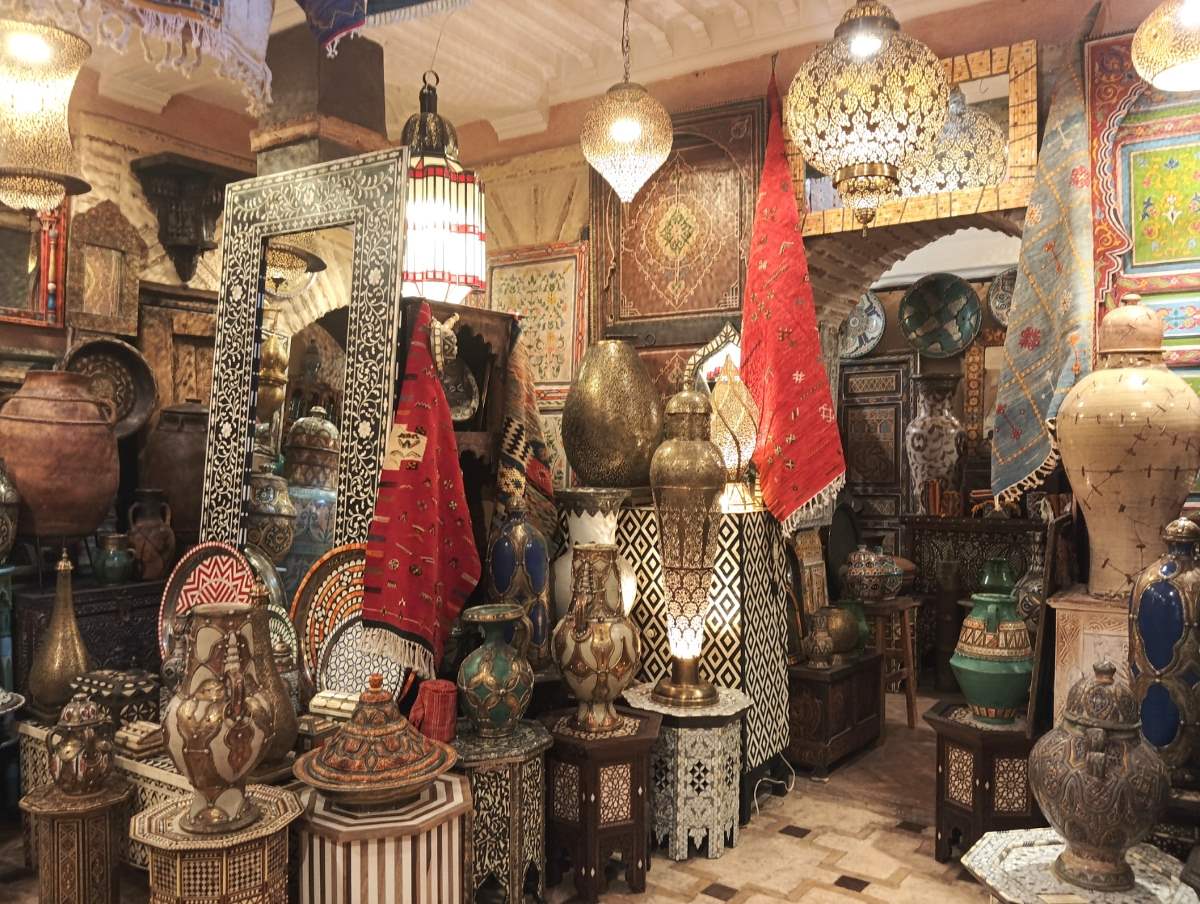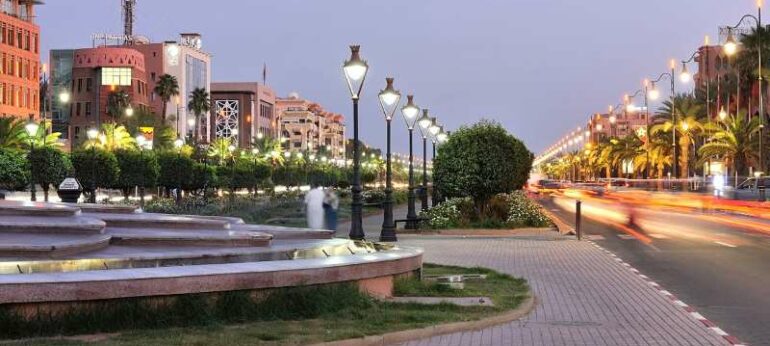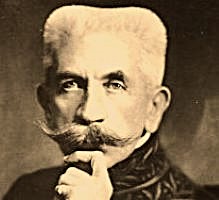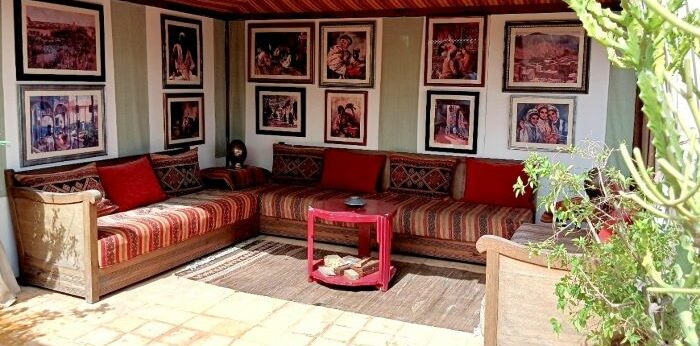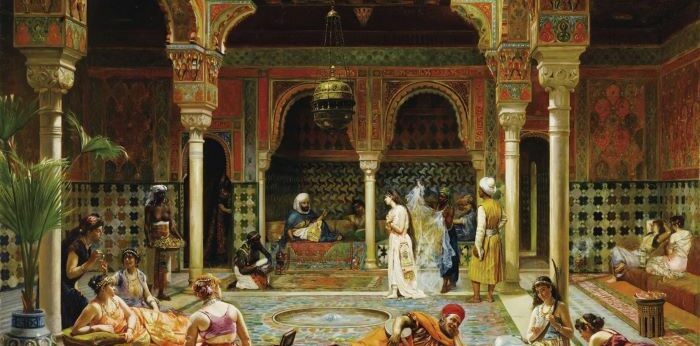In this last episode, I will tell the story of a Moroccan family. Over three generations, grandfather, sons and grandchildren, the passions of traditional craftsmanship and commerce are passed on. With pride in contributing to the country and its culture.
Southern Man
At the beginning of our story we find the grandfather. He comes from an Amazigh tribe Aït Atta, in the south-east of the Kingdom, in the mountain Saghro which culminates at 2712m, Adrar n Saghro. Grandiose landscapes, lunar views, desert perspective as far as the eye can see… A few rare little spots of greenery, pink and brown, made of palm trees, date trees, peaches, oleanders, come to brighten up immense earthy ocher and red areas.
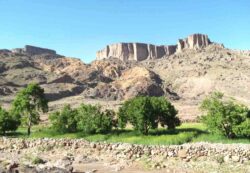
Jbel Saghro
The rocks sometimes bring the black color, the white appears with the almond flowers. Life is rough there but peaceful for the inhabitants of the villages. It is punctuated by shifting grazing for goats and sheep.
City lights
The young man soon feels attraction for the city and settles in the medina of Marrakech. He starts weaving raffia mats. From a utility object placed on the ground, the h’sira gradually becomes a decorative object.
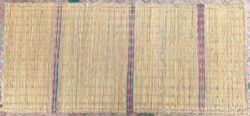
H’sira
The craft activity quickly developed. The small business is doing well enough to support a family and the man who had arrived from the mountains marries and becomes the father of five children. But life can be cruel and misfortune strikes ! The father dies and the mother is left to raise her children alone. The fourth son, still young but willing and tenacious will take over. In the 1960s, exchanges between the cities of Morocco intensified, tourism developed and a new impetus was given to trade.
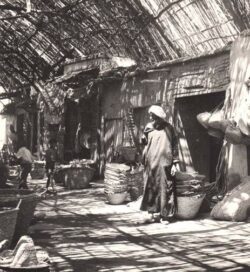
Marrakesh Souks in the 50’s
This son turns out to be an outstanding salesman. He finds his professional fulfilment , marries and becomes a father of six children. He becomes passionate about Amazigh rugs and then an expert, and a collector. In the souks his services are sought out ! Everything sells, Morocco and its crafts are really popular. In addition to carpets, leather goods, slippers, textiles meet growing demand. Of course he ends up opening his shop with one of his brothers.
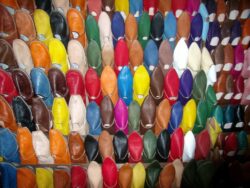
Marrakesh Express
His children, girls and boys, are doing well at university. But when a family has the lobes for business ! The father also passes on his knowledge, his interest in the art of weaving, his passion for carpets. He is enthusiastic when two of his sons and a friend decide to open a gallery in the district of Riad Zitoun Jdid, which was booming as a tourist attraction at the end of the 1990s.
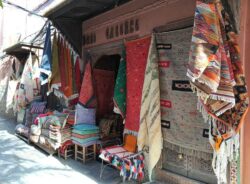
Dune Gallery Marrakech
The father acts as “guardian of the temple”, of the memory, of the virtues. His presence in the shop is a guarantee of seriousness, professionalism, and his sons continue to learn from him. As they have the capacity to develop their business internationally, they do not miss out on working extensively in export. The Dune Gallery was born, a guarantee of quality.
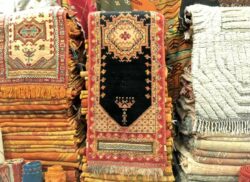
When the father dies, he leaves his sons a legacy of passion, respect and humanity. The collection of certified rugs is now impressive, not to mention the valuable antiques.
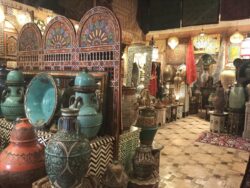
Dune Gallery
Today, I am talking with one of them..
Why, after your studies, did you finally come to sell carpets?
Of course my father passed on his passion for the art of Moroccan carpet to me. I fell into the pot! And the Moroccan carpet gradually gained a prominent place on the international market, which could allow us with my brother to have a little ambition and ensure the management of a company very open to export.
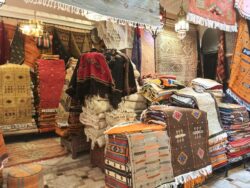
Dune gallery rugs
In your opinion, what makes the value and interest of Berber Moroccan rugs?
The “Handmade” without hesitation. I am still impressed by the fact that such wonders, real works of art, unique pieces, are created by hand with means that are often rudimentary !
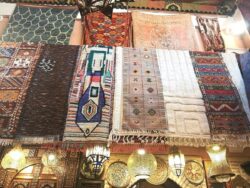
What are the nationalities of your most loyal customers?
I would say the French, the English, the Americans and the Australians who are also very fond of old rugs over 100 years old. These become rare but can still be collected in some villages. It must not be forgotten that each woman used to weave in every house!
Always a tricky question: what makes the price of a rug?
There is no single answer. In addition to objective criteria such as size, quality of wool, authenticity, sometimes age, weaving quality, density (up to 250,000 points per square meter)…there are more subjective factors, such as the decor, style, fineness of embroidery, the richness of the patterns and of course the treatment of natural colors. Taznakht, Amazigh, Akhnif, Mrirt rugs are obviously a guarantee of quality and beauty.
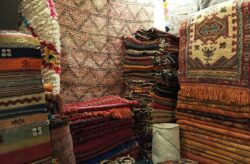
The rest is a question of feeling and, as we know, tastes and colors cannot be discussed!
What is your favorite style?
Yes, hard question ! In each style there are fascinating elements. The graphic universe and the colors of the Akhnif rugs still touch me and also some Zemmour rugs. Generally speaking, the meticulous work of fine embroidery captivates me. In fact I find it “incredible” that weavers are able to make such wonders! You have to see the two sides just to not believe your eyes !
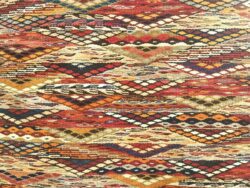
Dune gallery Akhnif rug Mkhrbak pattern
What part of your “antiques” business is in the gallery ?
About 50%. They are mainly pottery, ceramics of the Tafilalet,
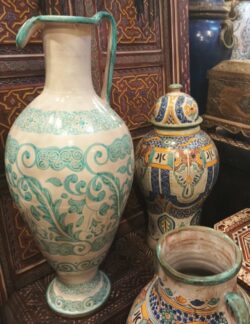
Dune Gallery Tafilalet Jug
of Tamegroute, Fez, Taroudant… Also wooden chests from the Rif region, old doors, bone and metal pieces from Marrakech and copper or chiseled brass luminaires. We also have some antique jewellery.
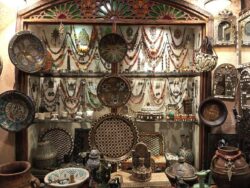
Dune Gallery Jewels
A little game, if you don’t mind: In one word, tell me what each of these rug styles evokes in you.
Beni Ouarain: warmth Boujaad: the soul of the Moroccan rug Azilal: naivety in a positive sense Akhnif: know-how Chichaoua: the colors of Marrakech Zemmour: nostalgia Tiflet: could be even better with silk Zanafi: the perfection of embroidery Tazenakht: origin and originality Beni Mrirt: it’s classy!
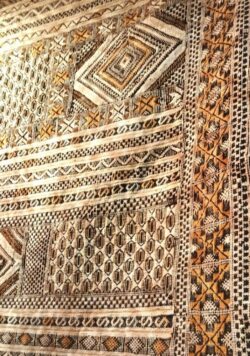
Tiflet Rug Dune Gallery

